Pump sprayers: features, types and rating of models
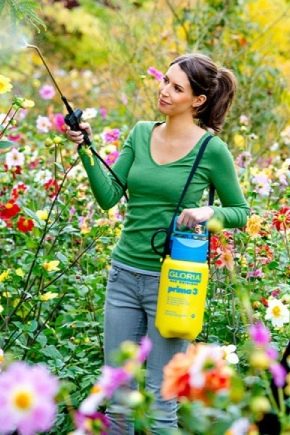
Pump sprayers are a common type of garden tool and are widely used to maintain garden and vegetable garden plants. The high popularity of devices is due to their simplicity and affordability, which is why they are considered the most popular type of sprayers among summer residents.
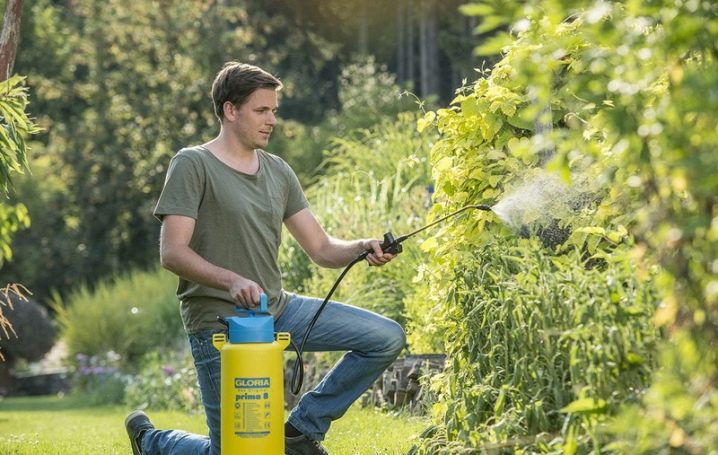
Peculiarities
The pump sprayer is designed to treat trees, shrubs, flowers, garden and greenhouse plants from pests, as well as to carry out healing and preventive treatments aimed at combating and preventing various diseases. Also, with the help of a sprayer, you can make planned foliar dressing and moisturize plants during a dry period.
However, the role of sprayers is not limited to the maintenance of green spaces. The device is often used for whitewashing trees, as well as for washing windows and car bodies. Thanks to such a wide range of applications, pump sprayers can be safely classified as universal devices.
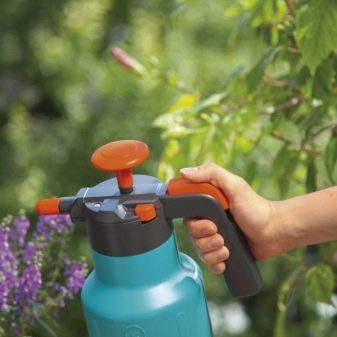
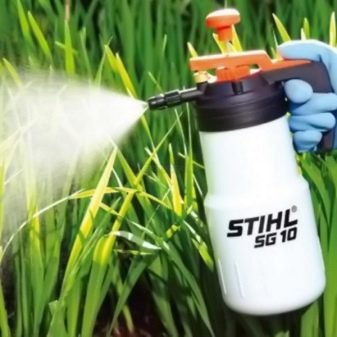
The pump sprayer is arranged quite simply. The device consists of a working container made, as a rule, of plastic, although sometimes aluminum tanks are also found, and a pump built into it - a water pump.
The volume of the working tank depends on the power and purpose of a particular model and varies from 1.5 to 30 liters... At the top of the container there is an outlet from which a flexible hose emerges. This hose, in turn, connects to a spray boom, popularly called a "fishing rod".
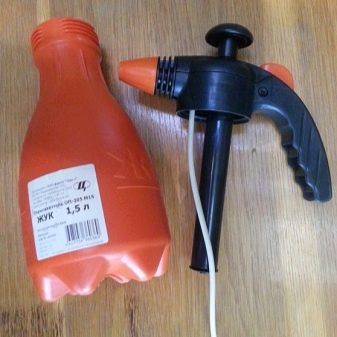
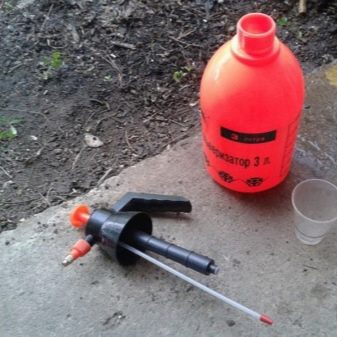
Closer to the base of the "fishing rod" there is a start button, by pressing which the system is put into operation, and its opposite end is equipped with a spray nozzle that converts water droplets into a fine water suspension, which, in fact, is used for processing.
The spray boom is often equipped with additional nozzles or has a telescopic design. This allows you to lengthen the "fishing rod" to the desired size and handle hard-to-reach areas of dense bushes or tall trees. Also, all pump sprayers are equipped with a special valve that serves to bleed off excess air and prevent the working tank from bursting.
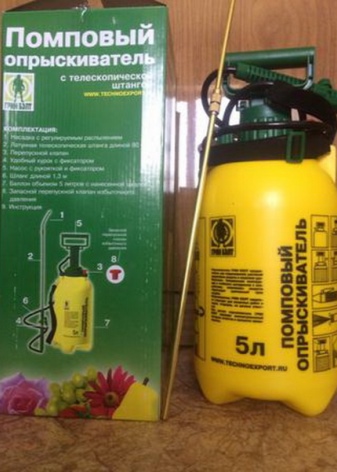
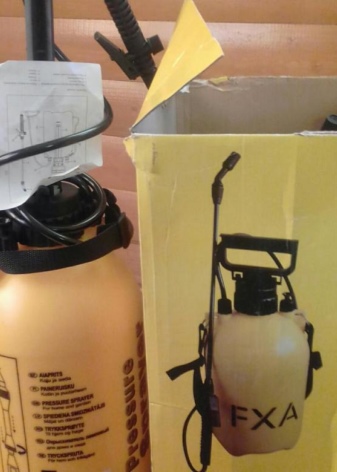
The principle of operation of the pump device is also quite simple and is as follows: by pressing the pump lever, air is pumped into the system, which creates an area of increased pressure inside the working tank. As a result, the compressed air begins to squeeze out the liquid, which, moving through the system of connecting hoses, enters the spray bar and through it is supplied to the spray nozzle or nozzle.
The pressure inside the working tank is about 5 atmospheres, and one pumping of air is usually enough for 30 minutes of operation.
Due to the need to press the lever using physical force, these sprayers are called hand-held sprayers.
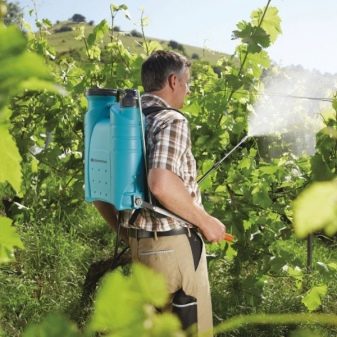
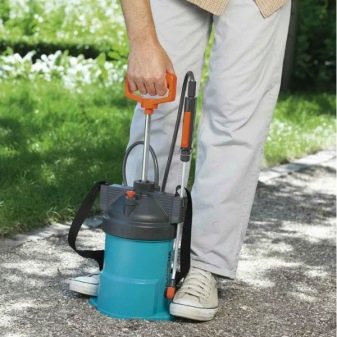
Views
The classification of pump sprayers is made according to two main criteria: the volume of the working tank and the method of moving the device.
According to the first criterion, all models can be conditionally divided into three large groups.The first group includes miniature sprayers with a volume of one and a half to three liters, which in their performance characteristics can be compared with miniature spray guns for indoor flowers, made in the form of a nozzle on a plastic bottle.
Greenhouse and indoor plants are usually treated with such devices, since they are not suitable for processing large areas.
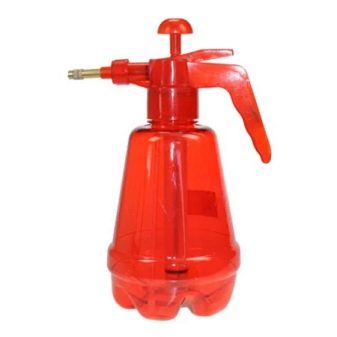
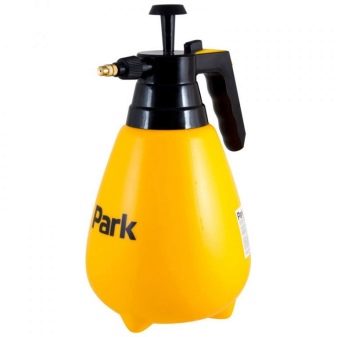
The next category of devices is represented by devices with a tank volume from 3 to 12 liters... With their help, you can process bushes and trees at their summer cottage, however, for spraying a large garden of such a volume, it will still not be enough.
And finally, the third group of pumping devices is represented by professional devices with capacious reservoirs, capacity up to 30 liters. Such devices are designed for processing gardens, small vineyards and fruit and berry nurseries.
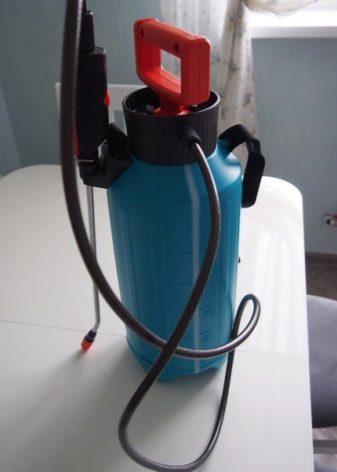
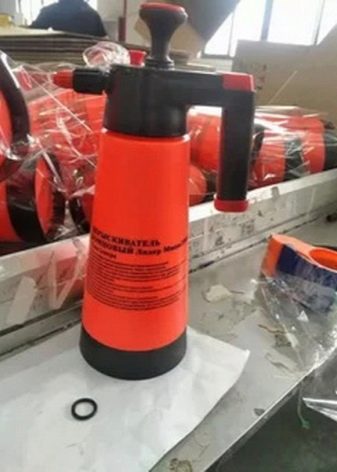
According to the second criterion - mobility - devices are divided into 3 categories and are knapsack, portable and wheeled.
- Portable hand The spray gun is a device with a volume of up to 3 liters and is used to carry out small work on the processing of seedlings, flowers or vegetable greenhouse crops. Using a handheld device, you can spray several small berry bushes, as well as a short fruit tree.
- Knapsack models are worn on the shoulders in the same way as a tourist backpack, and are used to treat shrubs and trees in hard-to-reach areas of the garden. The volume of the tank of such devices usually does not exceed 12 liters, thanks to which, with such a backpack, you can easily climb onto a tree trunk or a ladder.
- Wheeled the sprayer has a spacious tank and is designed for the treatment of large orchards and vineyards.
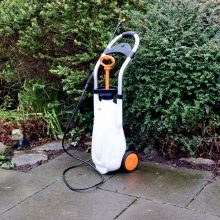
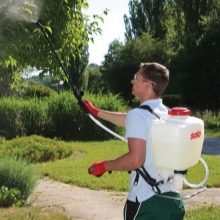
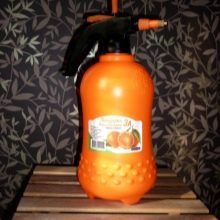
Advantages and disadvantages
High consumer demand for pump sprayers and a large number of approving reviews are due to a number of indisputable advantages of these devices.
- High reliability and long service life are explained by the absence of complex assemblies and mechanisms in the design of the apparatus.
- Ease of use and complete non-volatility allow using the device in places where electricity is not supplied. In addition, unlike gasoline models, such devices do not need refueling and do not require expensive and regular maintenance.
- The versatility of the device allows you to use it not only in the personal plot, but also in the household.
- Fast and easy refilling of working fluid adds convenience to the use of the device and makes it even more popular.
- The low cost, in comparison with other types of garden sprayers, makes the device a generally available and well-bought product.
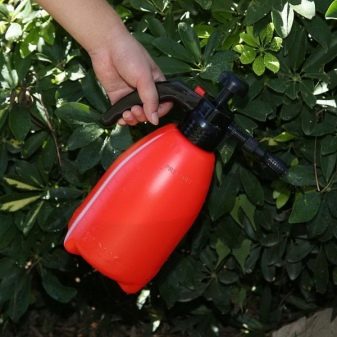
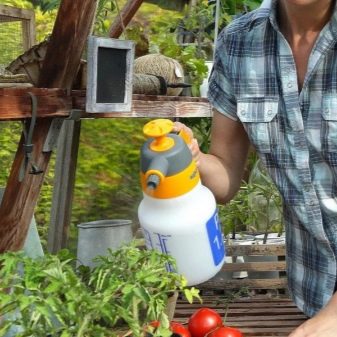
However, along with the obvious advantages, the pump unit also has disadvantages.
The disadvantages include the impossibility of processing areas over 30 acres. To spray such large-scale areas, you have to purchase a battery or gasoline model.
The disadvantage is the need to filter the working fluid before each treatment. This is due to the fact that the holes of the nozzle are often clogged, which is why it has to be removed and blown out.
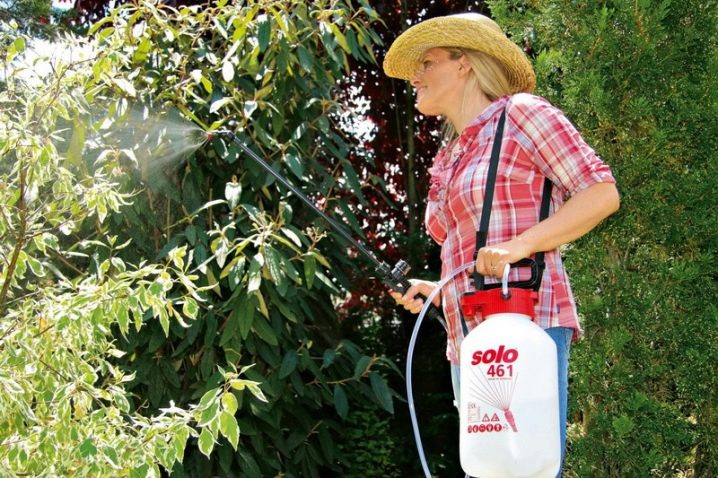
Instructions for use
The pump sprayer is easy to use. To do this, you just need to pour the filtered solution into the working tank, close the lid tightly, set the control valve to the open position and manually pump air into the pump. After that, you need to press the "start" button located on the spray boom and you can start spraying.
Many high-tech models are equipped with a function to adjust the intensity and angle of spray liquid. Therefore, before starting work, on such devices, you should set the desired mode.
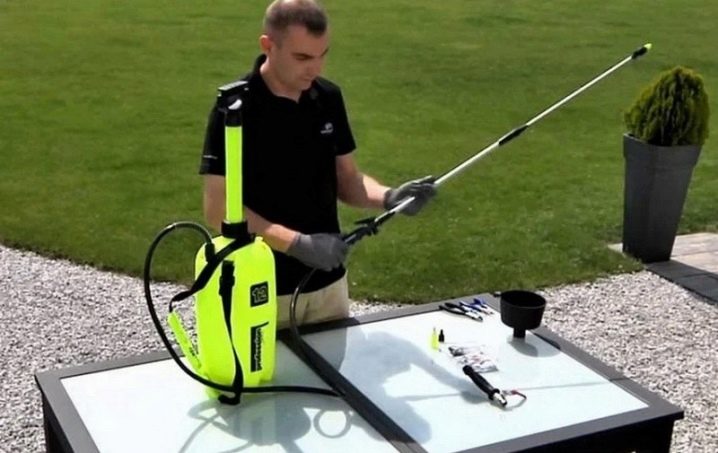
If it is intended to handle tall trees, the spray boom must be lengthened.
To do this, it is necessary to attach it with additional elements included in the kit, or disassemble it according to the principle of a telescope, if this is provided for by the design. During processing, it is necessary to monitor the speed and force of the sprayed liquid, and, in case of their weakening, it is necessary to periodically pump air with a lever.
After spraying is completed, it is necessary to unwind the "fishing rod", remove connecting pipes and rinse them well. The tank also needs to be cleaned regularly., otherwise, solid suspensions will begin to accumulate at its bottom, which can subsequently clog the nozzle holes. After thorough rinsing, the device is left to dry, after which it is collected and sent for storage.
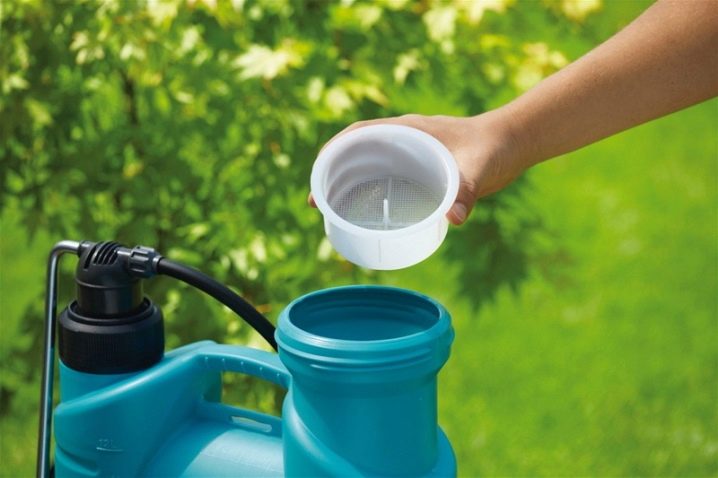
Model rating
In the modern market of agrotechnical devices, there are many different models of pump sprayers from a variety of manufacturers. And despite the fact that most of them are reliable and high-quality devices, some of them should be highlighted.
- The palm has been held by German company Gardenasupplying the most reliable and durable devices to the world market. The products of the enterprise are manufactured on high-tech modern equipment, and the raw materials undergo strict control and have all the necessary certificates. The only drawback of the devices is their price. So, a device with a 1.25 liter tank will cost the buyer 1200 rubles.
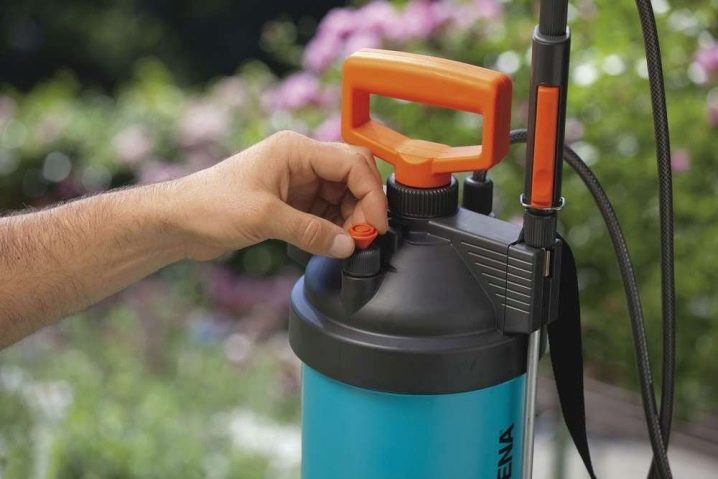
- Slovenian Sadko confidently took the second place. Its products are not much inferior in quality to German ones, but they are much cheaper. For example, a device with a capacity of 12 liters can be purchased for only 1000 rubles.
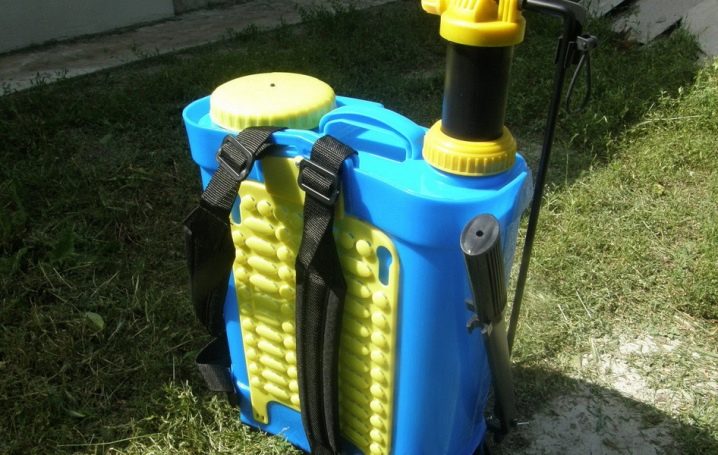
- Solo from Germany is one of the oldest sprayer companies in Europe and has been producing them for 70 years. For such a long time, the company's specialists took into account all possible comments and wishes of customers and brought their products to almost perfection. The cost of a five-liter device will be about two thousand rubles.
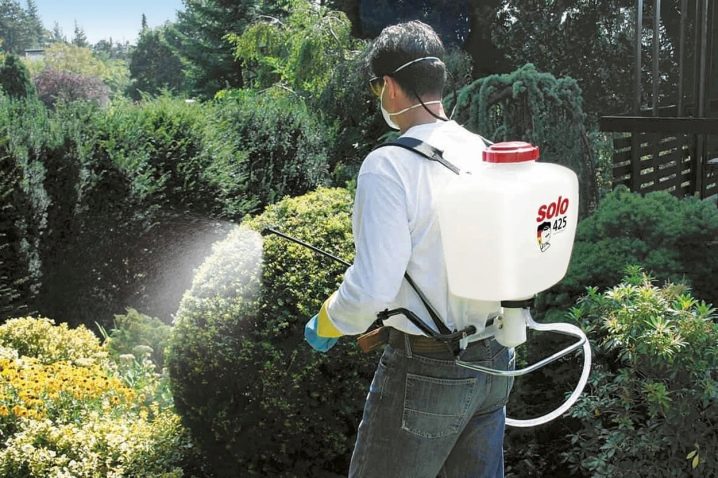
- The fourth place in the unofficial consumer rating is occupied by Chinese Grinda, which manufactures its products taking into account German developments. Sprayers of this company are distinguished by affordable prices and quite good quality. So, for a 4-liter device, you will need to pay only 860 rubles.
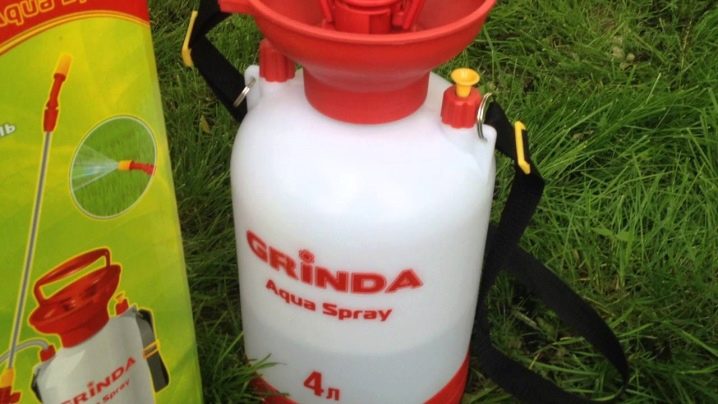
- And the top five of the leaders is completed by the Russian pump-action manual sprayer "Zhuk P-205" the cost of 500 rubles and the volume of the working tank is only one and a half liters. The model is quite purchasable and has proven itself well when processing small areas.
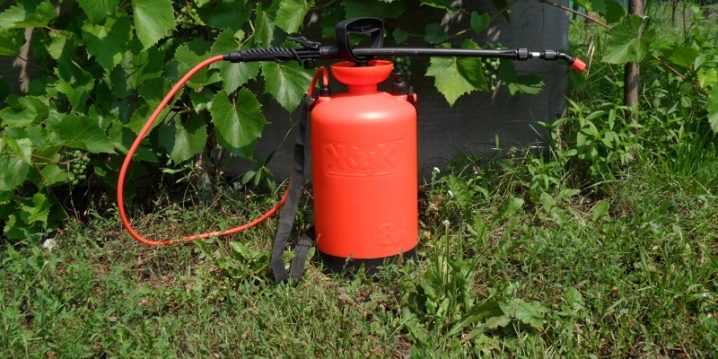
How to choose?
Before proceeding with the purchase of a pump sprayer, it is necessary to determine the volume of the working tank. To do this, you need to take into account the area of the cultivated area and the density of plantings on it.
If it is supposed to spray plants in a summer cottage with an area of 6 acres, then buying a 10-liter device will be enough, while for serving flowers on the balcony or seedlings it is better to buy a miniature liter device and not overpay for unnecessary volume.
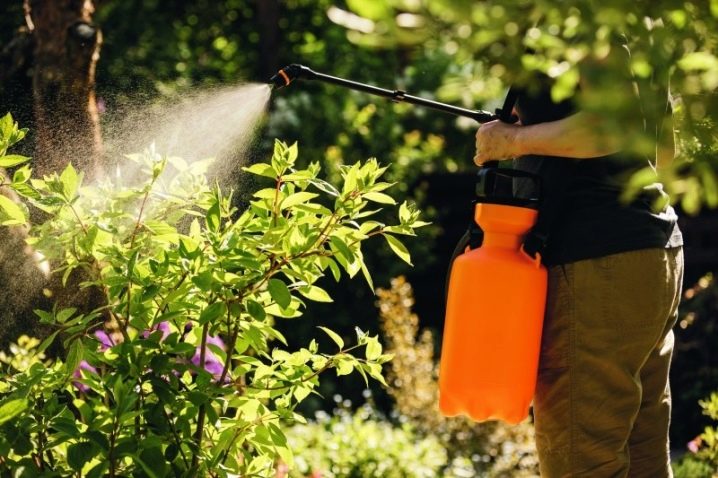
The next selection criterion will be the way the unit is moved. For example, a three-dimensional model on a trolley can be used to treat a garden with even terrain, while a knapsack device is required to treat a densely growing shrub or vineyard located on hills.
If it is planned to care for large plantations with difficult terrain, then pump models are indispensable. Such conditions require the purchase of a powerful self-propelled unit that runs on gasoline or a battery.
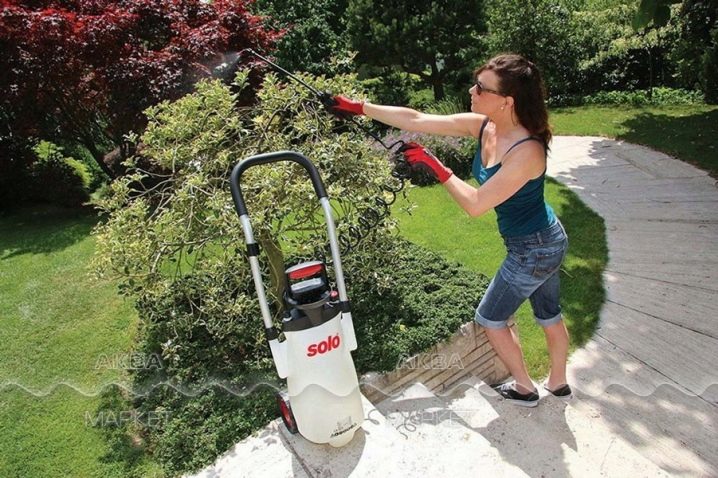
And the last criterion for choosing a device is the presence of additional components. For example, if you plan to spray tall trees and overgrown dense bushes, then you need to pay attention to the presence of extension tubes or a telescopic structure of the main boom.
Check for the presence of a filter. This will eliminate the need to constantly filter the solution and extend the life of the nozzle.
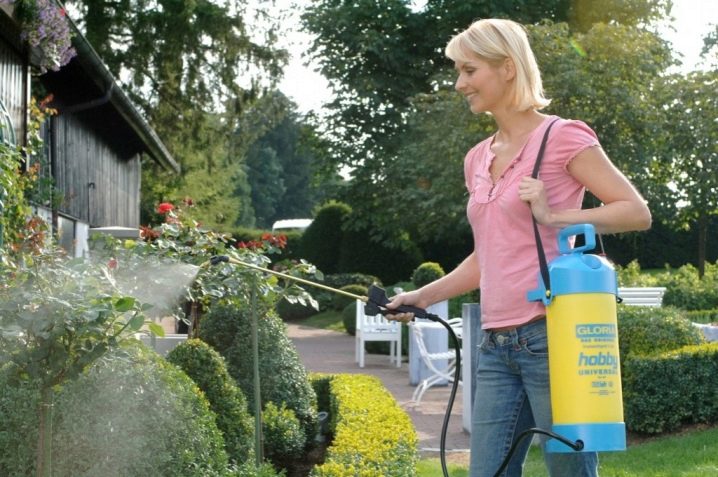
You will learn how to choose a pump sprayer in the next video.



































































The comment was sent successfully.